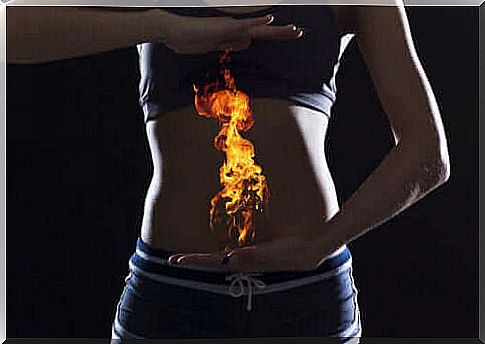What Causes Acid Reflux?

Pain or a burning sensation in the stomach area is a common symptom in adults. We also call it acid reflux. In this article we explain what acid reflux is and what causes it.
The burning sensation in your stomach, which can sometimes spread to behind the breastbone (the sternum in front of the heart), doesn’t always seem very bothersome. In any case, to solve this problem, you need to make some changes in your lifestyle.
What is Acid Reflux?
The stomach is an organ that is part of the superior digestive system. It is located in the abdomen, in the upper central zone. At the top we find the esophagus and at the bottom is the small intestine.
The stomach’s function is to help break down food. The acid it produces, called stomach acid, aids in the digestion of proteins and the absorption of iron, calcium and vitamin B12.
In addition, stomach acid kills a large part of the micro-organisms that we ingest and it limits the growth of bacteria. This also helps to prevent intestinal infections.
If the stomach acid doesn’t go through to the gut and actually travel back to the esophagus, then we experience gastroesophageal reflux due to the recurrent stomach acid.
At this point we need to clarify that this reflux is physiological to some extent. Such moments usually occur after eating, are brief, cause no symptoms, and rarely occur during sleep.
When reflux causes unpleasant symptoms or complications, it is known as non-physiologic gastroesophageal reflux. This is caused by acid reflux or pyrosis (Spanish link), a burning sensation in the stomach area or behind the sternum.
How and why do we get acid reflux?

When we eat, the food goes from the mouth, down the esophagus, and then to the stomach. Inside the esophagus and stomach is a circular muscle called the lower esophageal sphincter. This helps to prevent stomach contents from returning to the mouth.
When for any reason the acidity of the stomach rises again beyond what we call physiological reflux , you can suffer from acid reflux or heartburn. The exact reasons why we experience acid reflux are still being studied.
Several theories are possible (Spanish link), such as changes in the movements of the digestive tract, the acid production by the body, our stress levels or diet, in addition to psychological and hereditary factors.
We must make it clear that we are not talking about defined diagnoses, such as ulcers, gastroesophageal reflux disease, irritable bowel syndrome or gallstones. However, in any of these situations, you can also experience heartburn.
Risk Factors and What Causes Acid Reflux
As we mentioned, specialists continue to study the causes of acid reflux. However, there are elements that we now know are ‘risk factors’. We should try to avoid these whenever possible to reduce the risk of heartburn.
Diet is one of these factors (Spanish link). It can affect stomach acid levels in a number of people, especially when consuming certain products, such as:
- Spicy, fried, high-fat foods
- Citrus fruits
- Tomato-derived products (such as ketchup)
- Coin
- Chocolate
- Carbonated drinks
- Alcohol
Being overweight is another factor that can increase the risk of acid reflux. During pregnancy, it is common to experience it for a similar reason as the uterus expands and presses against the stomach. As a result, reflux develops.
When you need to see a doctor
In some cases, additional tests are needed if you suspect that the heartburn is caused by something specific. In such situations, it is always best to visit a specialist to determine what these are.
It is important to note that it would be cause for concern if a patient over the age of 60 develops acid reflux and has not experienced it before. Even more disturbing is if the patient also experiences gastrointestinal bleeding (characterized by finding blood in vomit or stool).
A lack of appetite is another worrisome factor, as is unexplained weight loss or difficulty swallowing. Sometimes the patient may also experience chest pain that is unrelated to a cardiovascular event, but originates from the digestive system.
In addition, if there is a history of cancer in the person’s immediate family (Spanish link), if their parents, uncles, aunts or grandparents have had any form of cancer, then it is important to pay close attention. If there are any symptoms that indicate that they are suffering from acid reflux, then see a specialist quickly.
What to do if you suffer from heartburn

For those who suffer from heartburn in the stomach or sternum, mild and sporadic, there are some things that can help. Here are some steps that would be helpful to follow as they can help improve symptoms.
- Losing weight in cases where the affected person is overweight (Spanish link).
- Raise the head of the bed: This can be done by placing blocks of wood or rubber under two legs of the bed or a wedge under the mattress. Do not use too many pillows, as this can cause neck pain.
- Avoid certain foods that make symptoms worse: These include coffee, chocolate, alcohol, mint, or foods that are greasy, fried, or highly spiced.
- Quit smoking: Tobacco is a cause of heartburn (Spanish link).
- Don’t eat too late: Going to bed with a full stomach can make reflux worse. We should try not to eat at least two to three hours before going to bed.
Specialists recommend using commercially available antacids in moderation. It is always best to see a medical professional about such complications. If your symptoms become more severe, appear at night or last for a long time, we recommend that you see a professional as soon as possible.









